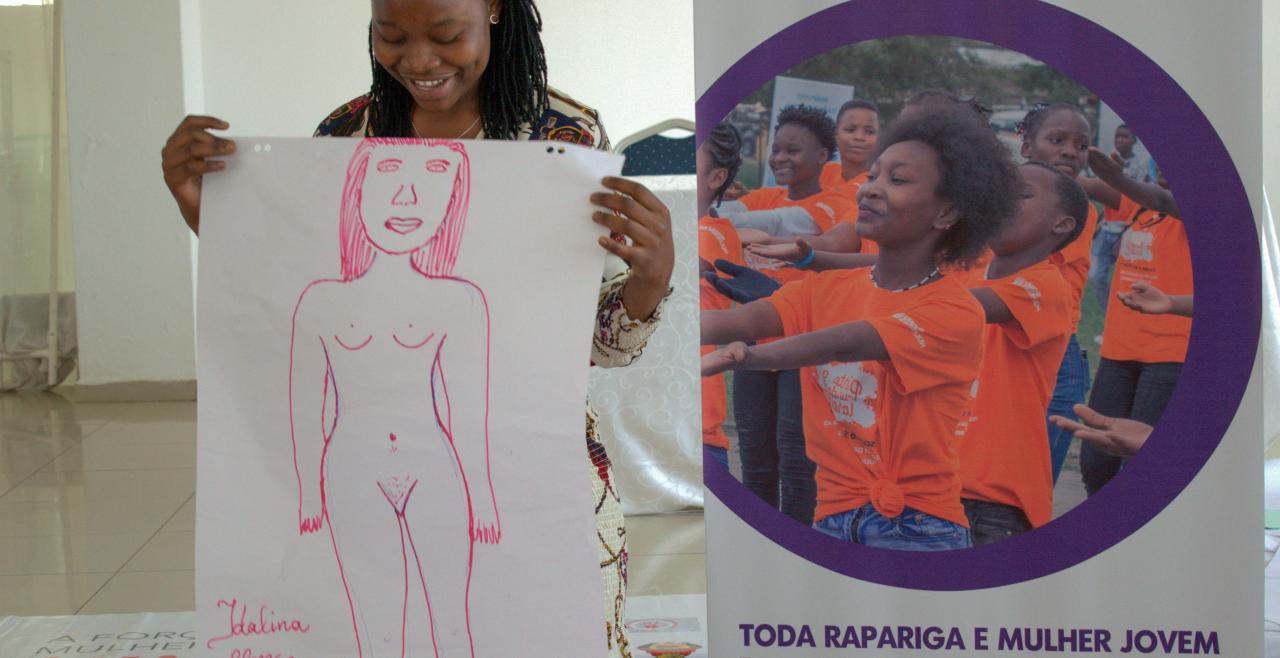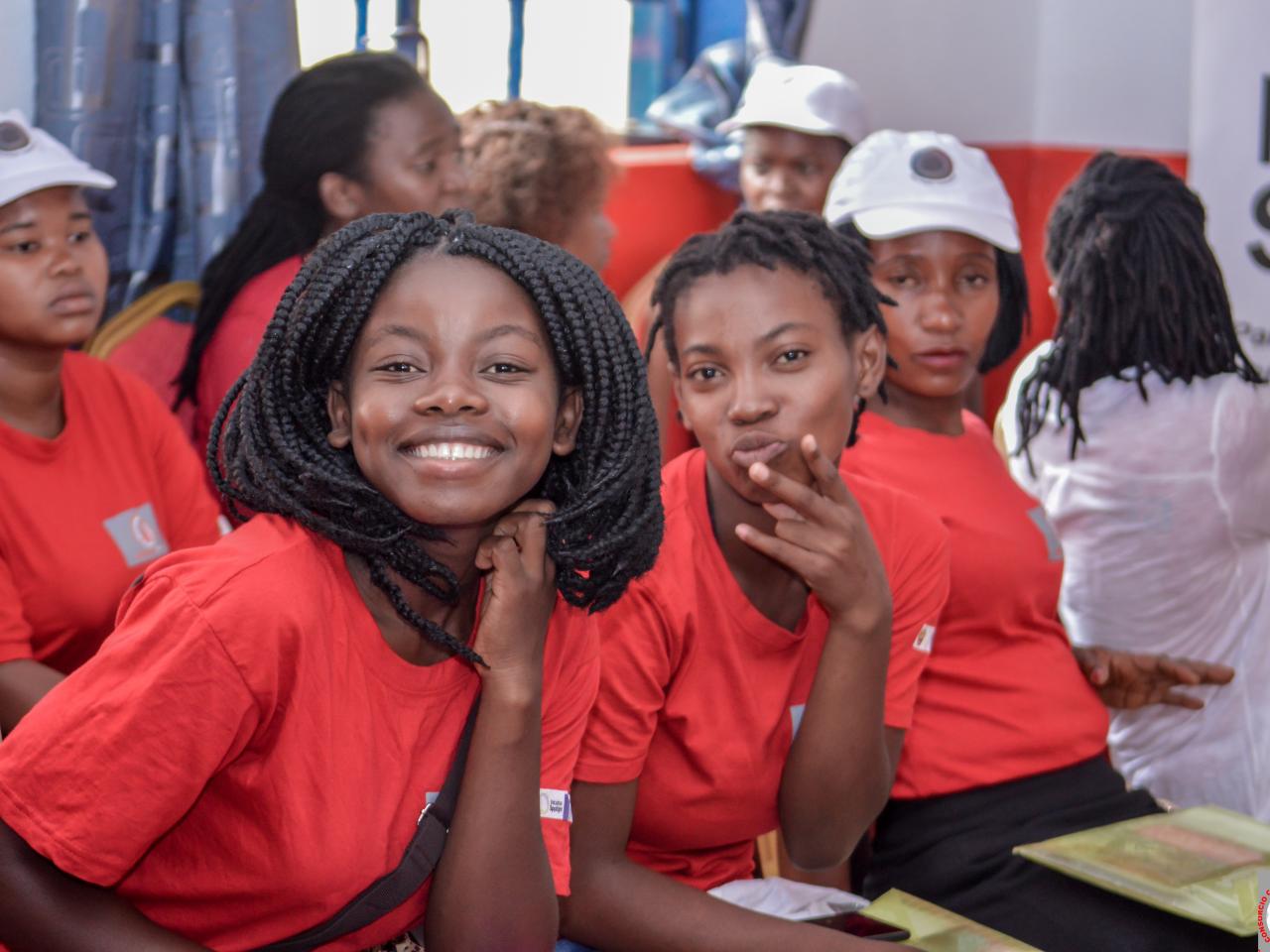Activists are working together to break the silence on intimate partner violence

MAPUTO, Mozambique - Eight girls sit on straw mats in a dusty courtyard in Gaza province, southern Mozambique. They share their stories about abuse, violence and overcoming trauma.
Celeste*, 21, a young woman with a gentle smile, leads the group. Her story resonates with the other girls: “I have been through abuse and I know how much it hurts,” she says.
The group, called “Fala Minha Irmã” (Speak My Sister, in Portuguese), is a debate space promoted by Associação Sociocultural Horizonte Azul (ASCHA), a youth organization funded by the Spotlight Initiative. Within this group, girls and young women can safely share their experiences, learn about gender-based violence and break the silence on abusive relationships.
“I lived in constant fear. One day he beat me so hard that I could not speak for three days” – Celeste, 21, survivor of gender-based violence
Celeste was 16 when she started a relationship with a powerful man. After an initial happy phase, the relationship turned sour and she was afraid of his violent outbursts.
“I lived in constant fear. One day he beat me so hard that I could not speak for three days,” Celeste says.
She tried to leave him several times. But every time she did, his anger worsened. He threatened to harm her family, tried to run her over with a car and repeatedly beat her. She was afraid of leaving the house and started missing school.
Although she felt scared and resentful, Celeste gathered the courage to report him at the local police station. But when her partner found out about her intentions, he used his influence and wealth to impede her from reporting. Then, he kidnapped her, tried to rape her and threw her out of the car at speed.
“I could not share this with my family,” says Celeste.
Celeste shielded her family from the abuse she was suffering, even though they lived under the same roof. Following episodes of violence, she would often go to her sister’s house. She thought violence was normal. Exhausted and resigned to the situation, Celeste almost agreed marry her abusive partner just to appease him.
An unexpected turn of events
Having been linked to grassroots organizations for some time, Celeste received an invitation to join a training session on human rights and gender-based violence held by ASCHA with the support of Forum Mulher, another organization funded by the Spotlight Initiative.
At the training, she learned about women’s rights and about the many forms that gender-based violence can take.
She also realised that, according to the latest Demographic and Health Census (2011), she was among the one in three women in Mozambique who have suffered violence during their lives. The same study reveals that among these women, 61 per cent suffer violence at the hands of an intimate partner – also a statistic that Celeste could relate to.
During the training, participants were encouraged to share their experiences. Confidentiality was guaranteed. Celeste felt safe and opened up about her ordeal for the first time.
“What I learned in the training motivated me to seek liberation," says Celeste.
From survivor to a powerful role model
At this point, things started to change. Members of ASCHA recognised the agony that Celeste was living in. They spoke to her, offered to escort her in the streets for protection and after some time invited her to become an activist.
Celeste trained to become an activist and started participating in door-to-door campaigns to teach communities about preventing sexual gender-based violence and child marriage, as part of the “Consortium Against Sexual Violence” – a network of seven women’s organisations working to prevent sexual and gender-based violence under the Spotlight Initiative.
“What I learned in the training motivated me to seek liberation”– Celeste, 21, survivor of gender-based violence
Her former partner threatened her more times, but his threats became weaker and increasingly infrequent as he realised that Celeste was no longer afraid of him. He also understood that Celeste was emboldened with knowledge. She was empowered and protected by a network of women’s organizations working under a government-led programme, and her former partner finally left her alone.
“Today, I can walk the streets alone. I am no longer afraid," says Celeste.
However, Celeste’s aggressor never faced justice.
Trauma, fear, the normalisation of violence and barriers in the access to support services prevent many survivors from reporting.
Underreporting remains a huge issue in Mozambique, as it does around the world. Global data suggests only four in ten women who experience violence seek help of any sort, and of these, only one in ten appeals to the police.
With support from the Spotlight Initiative, the government is training service providers and strengthening national institutions to ensure that cases of gender-based violence are properly followed up, survivors protected and perpetrators held accountable.
In 2020, police school curricula were improved to include gender-based violence prevention and human rights as part of cadets’ training. Key institutions, such as the Supreme Court, the Attorney General’s Office and the Criminal Investigation Service have established Gender Units.
Over 1,000 staff from the justice sector are now trained to enforce a new package of laws approved by the National Parliament to protect women and girls from violence. This imporves the ability of formal justice to respond to gender-based violence cases and hold perpetrators to account.
Meanwhile, Celeste continues to work as an activist. She leads the “Fala Minha Irmã” debate space, conducts awareness-raising campaigns and speaks about women’s empowerment on local radio programmes. Her fellow activists call her “Poderosa” (Powerful, in Portuguese). Since she joined ASCHA in 2019, Celeste has helped over 50 girls in vulnerable situations and inspired many more to claim their human rights.
She is one among hundreds of activists working with over 20 civil society organizations under the Spotlight Initiative in Mozambique. Together, these activists have reached over 600,000 people with vital information about preventing GBV and child marriage. Little by little, they are contributing to a Mozambique where every woman and girl can live free from violence.
*name was changed
By Leovigildo Nhampule and Leonor Costa Neves


